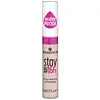What's inside
What's inside
 Concerns
Concerns

No concerns
 Ingredients Side-by-side
Ingredients Side-by-side

Water
Skin ConditioningCyclopentasiloxane
EmollientPEG/PPG-18/18 Dimethicone
EmulsifyingDimethiconol
EmollientCyclohexasiloxane
EmollientSodium Chloride
MaskingC30-45 Alkyl Methicone
EmollientC30-45 Olefin
Skin ConditioningMica
Cosmetic ColorantPolysorbate 80
EmulsifyingTrimethoxycaprylylsilane
SmoothingHydrolyzed Wheat Gluten
MoisturisingEthylhexylglycerin
Skin ConditioningCeratonia Siliqua Gum
EmollientTriethoxycaprylylsilane
Phenoxyethanol
PreservativeCI 77491
Cosmetic ColorantCI 77492
Cosmetic ColorantCI 77499
Cosmetic ColorantCI 77891
Cosmetic ColorantWater, Cyclopentasiloxane, PEG/PPG-18/18 Dimethicone, Dimethiconol, Cyclohexasiloxane, Sodium Chloride, C30-45 Alkyl Methicone, C30-45 Olefin, Mica, Polysorbate 80, Trimethoxycaprylylsilane, Hydrolyzed Wheat Gluten, Ethylhexylglycerin, Ceratonia Siliqua Gum, Triethoxycaprylylsilane, Phenoxyethanol, CI 77491, CI 77492, CI 77499, CI 77891